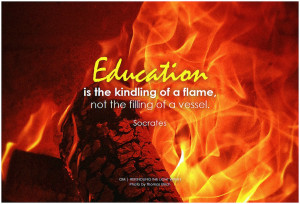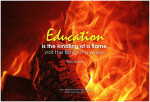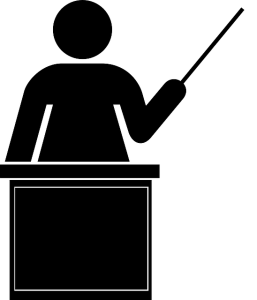by Author Bob Webb – ICPA.org:
A burning desire to learn is the key to a fulfilling lifestyle. It’s something school rarely inspires.
What is education? Is it knowledge in basic skills, academics, technical disciplines, citizenship…or is it something else? Our formal education system says only the academic basics are important, emphasizing the collection of knowledge without understanding its value. What about the processing of knowledge—using inspiration, visionary ambitions, creativity, risk, motivation and the ability to bounce back from failure? These skills are associated with understanding the value of knowledge, but many education institutions don’t consider these skills. There is a huge, disconnected gap, which is a problem for high school students in particular.
Thomas Edison and many other super achievers never finished school. They succeeded because they knew how to research information for a selected project and process that knowledge. The classroom environment does not work that way. It focuses on the collection of knowledge with no clear purpose other than high grades. If pleasing the teacher does not motivate, then there is nothing to process, outside of memorizing answers for a test. The typical student is academically challenged while being starved for motivation. Lack of motivation is lack of knowledge-processing skills. The typical college graduate will emerge with a professional skill that can provide for life’s basic needs, but that’s all.
What is education? All the elements in my opening paragraph relate to education, and all should be considered. This would be ideal, but “all” is not possible where performance must be measured. Only what can be measured will be selected, and the measuring tool is the written test. Anyone who does not have the ability to put clear thoughts on paper is labeled a failure. Natural skills, including knowledge processing, do not count. What is exercised grows stronger, and what is ignored stays dormant. The classroom exercises the collection of academics, leaving all other natural skills in the closet.
Tests do not measure intelligence or ability; they do not measure how the mind processes information, how motivating experiences develop persistence, or how the mind sorts out instincts, opinions, evaluations, possibilities and alternatives.
Knowledge by itself has no value; it is like a dictionary filled with words. Words alone have no value; they are given meaning by the process of stringing them together. Unfortunately, our education system is becoming a system that memorizes the dictionary. When students have memorized selected knowledge, then they are given a one-day test, based on dictionary knowledge, which will influence their employment opportunities for the rest of their lives. Natural skills are not considered. Is this how America became the world’s economic leader? No! Knowledge only has value when used with a process, and process in an artificial environment is not predictable or measurable.
Achievers in life use inspiration and motivation to overcome barriers. Teaching to the test does not inspire or motivate anyone. Memorizing does not inspire a love of learning; in fact, it does just the opposite. Education’s goal should be to develop a love of learning that stays with students throughout their lives. Education should be a lifetime experience, not limited to youth.
Educators are switching to tests because there is a crisis in education of their own making, and society wants measurable results. This pressure is passed on to political leaders, who base political decisions on measurable academic testing. These tests are based on acceptance of the educational status quo. Every student must now become an academic intellectual, or be labeled a failure. Natural talent and knowledge-processing skills do not count. More and more students are receiving the “failure” label, all because the system measures selected knowledge on a one-day standardized paper test.
Consider a parent who is having a problem with a word processor. On his own, he can’t solve the problem. He’s been collecting knowledge for years, but his knowledge processor is in hibernation. With any new gadget, someone has to teach him; he can’t figure it out for himself. His 13-year-old son comes to the rescue. The boy has limited knowledge, but he knows how to processes available information. He explores the word processor problem until he finds a solution. He is not unusually smart—this is just a teenager’s natural approach to finding solutions.
All young children have a natural talent for creatively processing information. It’s during the teen years that natural creative processing is replaced with the status quo: memorizing knowledge, without regard to how to process it. In the classroom, memorizing is what counts. Standardized testing reinforces the status quo. It kills creative processing ability. Status quo attitudes will follow children into adult life, where they will have to ask their children for help.
Today, the educational system has a new tool on the market: behavior-control drugs. Any student who refuses to accept the status quo is labeled a troublemaker and will be drugged. The glassy-eyed student will then behave in the classroom, and school officials will receive high performance ratings. The student may get passing grades and land a job with a comfortable wage, but that will be the extent of it. His teenage dreams and great ambitions will be gone.
Fact: Self-made millionaires are not “A” students in the classroom. The way they process knowledge conflicts with classroom priorities. The self-made millionaire has a vision. Then he researches specific knowledge, applies intuitive knowledge and processes all the elements, searching for a workable solution. Millionaires are made by finding alternative ways to do common tasks. The secret is vision, research and processing, not pre-stored knowledge alone.
The typical employer wants employees with dictionary knowledge, not visionaries. Businesses want employees who follow orders, are willing to do repetitive tasks, are happy with a limited role, and accept the status quo. Repetitive tasks means efficiency, which is where profits are made. Also, accepting the status quo prevents the exposure of blunders by leaders. Too many blunders, and profits disappear. In a status-quo environment, visionaries become bored quickly and soon receive the “troublemaker” label when they offer alternatives or expose blunders. This sometimes leads to dismissal, even though their ideas can increase efficiency and create new sources of profits for the company. In the long haul, visionaries are the ones who make above-average wages, no matter their formal education level. But with behavior-controlling drugs, the education system now has the tools to eliminate this type of person.
As I write this, e-learning is becoming an education model that the present system cannot compete with. It focuses on what motivates, rather than what the system thinks is good for students. It is also sidestepping politicians, textbook industries, testing companies and unions. These forces are now fighting back, trying to maintain a system that is in their own interest, instead of the students’. At this time, they are focusing on standardized testing, which seems to be a last-ditch effort to maintain the status quo.
What can be considered a quality education? A quality education is custom designed, addressing the unique abilities of each student, and provides a positive emotional experience. Customized education evaluates natural talent and how a student learns. This is why home-schooled students outperform classroom students. Parents learn what works and what doesn’t, and then focus on what works. With this method, students develop a love of learning, and learning becomes a lifelong process.
Which type of education environment do you think will produce consistent winners?
Article originally posted at ICPA.org.


